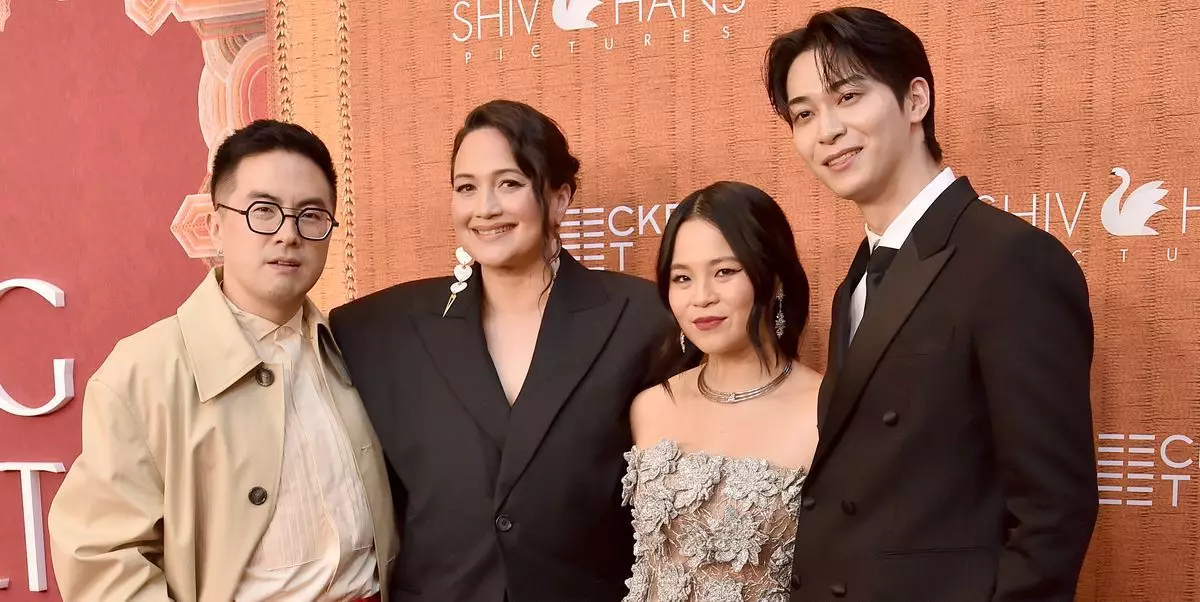“The Wedding Banquet” emerges as a vibrant reimagining of Ang Lee’s 1993 queer cinema classic, brilliantly helmed by writer-director Andrew Ahn. Set against the lush backdrop of Seattle, Ahn’s interpretation delves deep into the intricacies of love, friendship, and identity amid cultural expectations. At its heart lies a seemingly simple green card marriage proposal that unravels into a tempest of emotions and comedic moments, delivering not just laughter but poignant reflections on what it means to find one’s place in an often-chaotic world.
The film’s ensemble cast is a treasure trove of talent, featuring Kelly Marie Tran, Lily Gladstone, Bowen Yang, Youn Yuh-jung, and Han Gi-chan. This star-studded lineup not only guarantees strong performances but also amplifies the movie’s themes of authenticity and connection. Each character contributes to a rich tapestry that questions traditional notions of family and love.
Unpacking Cultural Expectations
At the center of the narrative is Min, played by Han Gi-chan, a closeted Korean heir who yearns to stay in the United States. His proposal of a green card marriage to Angela (Kelly Marie Tran) serves as the catalyst for the unfolding drama. Angela’s condition that Min must fund her partner Lee’s (Lily Gladstone) IVF treatments adds an amusing yet meaningful layer to the arrangement. This quirky agreement highlights the intersections between love and obligation, uniquely examining the dynamics of familial expectations, particularly within immigrant communities.
As the traditional grandmother, Youn Yuh-jung introduces both humor and a compassionate lens through which viewers can explore themes of generational conflict. Her insistence on a lavish wedding ceremony heightens the tension, merging modern dilemmas with age-old customs. This clash of ideologies resonates with anyone grappling with their identity against the expectations of their family and community.
Personal Journeys and Transformative Experiences
For the talented performer Lily Gladstone, the role of Lee provided an opportunity to embrace her comedic abilities, allowing her to explore dimensions of her character that elevate the overall narrative. She describes her portrayal as a chance to inject a delightful level of goofiness into a role that otherwise might be perceived as the “straight man.” Gladstone’s reflection on the character’s dynamics demonstrates her insightful grasp of the balancing act between humor and emotional depth—a hallmark of the film’s success.
Kelly Marie Tran’s involvement in the project is particularly striking, as she publicly came out as queer during production. The emotional release that accompanied her character’s journey on screen offers a personal connection that bears testament to the film’s thematic depth. Tran’s declaration reminds audiences of the power of representation in media, showcasing how art can serve as a safe space for self-exploration and acceptance.
The Fertile Ground of Collaboration
The collaboration with original writer James Schamus further enriches the film. His return to co-write the screenplay ensures that the new iteration retains the charm and essence of the original while infusing contemporary relevance. Lily Gladstone’s praise for Schamus reveals how the film succeeds in bridging the gap between legacy and innovation—a feat that is often challenging in the realm of remakes.
Director Andrew Ahn’s vision extends beyond the screen; he seeks to cultivate a supportive community among the cast and crew. Ahn’s idea of filmmaking as a collaborative journey speaks volumes about the intent behind the project. Through their shared experiences, Ahn has fostered not just a film, but valuable relationships that he hopes will endure beyond the confines of production.
A Timeless Narrative of Family
Ultimately, “The Wedding Banquet” stands as both a tribute to the original film and a heartfelt story that transcends time and place. Gi-chan’s comment that “it is a story for all times” encapsulates the essence of the film, which resonates universally, regardless of cultural backdrop. As audiences navigate their own diverse experiences of love and belonging, the film delivers a poignant reminder: family can take myriad forms, be it biological or chosen, and it is the bonds we create that shape our identities.
Amidst the celebratory chaos of wedding preparations, humor, and misunderstandings, “The Wedding Banquet” is a joyful exploration of the intricate dance between duty and desire, ensuring that viewers are not just entertained, but deeply moved.

